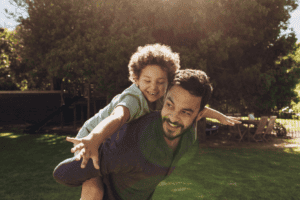Listen to this content instead on our podcast
Getting a new diagnosis for your child is a big moment. If you have just learned your child has a disability, you might be scared. Or confused. Or relieved. Or overwhelmed. All of the above? That sounds about right.
How do you cope?
Let’s talk about how to get through this experience so you can keep being the best parent you can be to your child. (Spoiler alert: you may find joy ahead).
Give yourself room to breathe.
You’ve just gotten some important news. Maybe it’s a shock, or maybe you’ve known for a long time that this diagnosis was coming. Maybe this is something you and your child share and you’re thrilled – but it’s still big news.
Take a minute. Try not to jump right into action.
It will feel like you need to do everything RIGHT NOW! to support your child. But in most cases, the diagnosis is not really an emergency.
You have time to take a breath, and you probably really need one.
A new diagnosis can feel like an elephant. But the only way to eat an elephant is one bite at a time. So your first bite – the first thing you need to do – is to give yourself some time to process and to ask all of your questions.
Shift your perspective
Recently, our team met Rob Hudson and his daughter Schuyler, who live in Northern Virginia. Hear what Rob has to say about the moment when 3-year-old Schuyler was diagnosed with polymicrogyria.
Click to Read Transcript
She was diagnosed when she was three and we had been going through hearing tests and what not because her language wasn’t developing and that was, you know.
She had, we, I was working at Yale at the time. You know, not. I would say that people like “ooh a professor” like no. [Schuyler teases: ooh important] I was doing tech support, I was a bit low on the food chain at Yale but, because I was working at Yale, I had my health insurance was basically the yellow med school. So, we had the opportunity to try a lot of different things that I think someone who is in a different situation wouldn’t have. And just, you know her neurologist was like “You know what, let’s do an MRI. Why not? It’s free, we got this big machines (sic), stick her head and see what we find!” And that’s how she was diagnosed.
And it was, um– it was really hard. Cause I think we had started off looking for, you know a learning disability, maybe a hard of hearing whatever. And when the answer we got was this brain malformation that affects… [Rob addressing Schuyler: What they say?] like between 60 and 75 percent of her brain was affected by this. [Schuyler: yes] And-and — that was hard because you’ve got to let go of a lot. You got to let go a lot of your preconceived notions. The reality is those preconceived notions are kind of dumb anyway, you know.
But as parents are the things that we hang on to. Like I know my dad for years was “Like oh, my kid’s gonna play football” and then I played trombone in the band which was the worst, had the worst betrayal. So you go in with these ideas of what the future is going to be like. [Schuyler: yeah] And those ideas I mean, I can’t imagine they ever work out.
But you know, with Schuyler in this diagnosis and the diagnosis always comes with the list of here are the terrible things, and here’s the things you know. And even as a parent you take all the things that well here are the possible outcomes, and you turn them into this is absolutely what’s going to happen. Get ready for it because this is the hurricane. It’s going to be a category five. Schuyler- yeah! Ya can’t get away from it and then the reality is-is more subtle. I wish if I could go back in time and tell myself something, back then I think I would say: it’s not gonna be the terrible tragedy that they are predicting.
And that some of it’s going to be bad, but a lot of it’s not going to be that terrible and even the bad stuff you’ll figure out. You know, and the other thing I would tell myself is you know, and this is going to sound corny but, even you know, getting that diagnosis was in a lot of ways the privilege of a lifetime. Because it allowed it allowed me to know what my life’s work was going to be.
Rob described getting a new diagnosis as feeling like a category 5 hurricane. But the reality rarely looks or feels that way, and here’s why:
Having a disability is not a tragedy.
A disability is not the sum of who a person is.
(Go read that again. Louder this time for the cheap seats in the back).
When you learn your child has a new disability diagnosis,it might feel like everything has changed. And that can feel hard and scary and sad.
But there is SO MUCH MORE to this story.
You have your beautiful child. They are still the same person you have always loved. And now you know them better and you can understand how to meet their needs in new ways as you make dinner or argue over brushing teeth or tuck in your toddler for the 15th time tonight or blow kisses at the back of your teenager’s head as they ride away on their bike.
And don’t forget: the only constant is change, and this is especially true with children. The disability may not change, but your child’s behaviors and needs and feelings – and your feelings – all will. This may feel overwhelming right now, but it won’t feel that way forever.
Find your people
Who are the people who have supported you as a parent? Who are the people who just adore your child? It may feel hard to talk to anyone about this, but support is really important right now.
Start with your inner circle and ask for what you need. Someone to listen. Distraction. A cup of coffee left on your doorstep one morning. Whatever it is you need, let your people know that you need them to be there for you and your child right now.
If you are a person who struggles asking for help (so many of us do), find someone who can ask for help for you – maybe a close friend or partner or a sibling.
Surround yourself and your child with the people who can show up for your family in a way that feels like love.
Find some role models
Find some adults who share your child’s disability or important elements of it. We all need mirrors.
The adult role models I have met have helped me understand so much about how to meet my children’s needs and – just as importantly – how to see all of their strengths. They have literally changed my whole way of parenting.
Role models can be people you get to know in real life, movie characters, books (here’s a great one for parents of autistic children), or people who you follow on social media. Here are some suggestions for finding these role models.
Learn about your resources and line them up
This is where you may start to feel like you are in way over your head. Remember what I said before about how to eat an elephant? Make a list. Figure out where you want to start and do one thing at a time. You’ve got this.
There are three main systems that can support you and your child:
-
Medical or health care – this includes evaluations, treatment, and referrals.
-
Government benefits like SSI, Early Intervention, and Medicaid (your child may qualify even if your family makes too much money to be eligible)
-
School system
Read more about these systems and how to navigate them.
Become a fierce advocate for your child – and teach your child to advocate for themselves
In our interview with Rob and Schuyler, Rob pointed out:
Click to Read Transcript
Which is an odd thing to learn in your mid-30s right, and that life’s work was going to be absolutely worth it. And that anyone who looked at me and looked at Schuyler, and felt sorry for either one of us, that’s somebody who absolutely didn’t get it. You know, I like to hear people tell me how they’re jealous they are. That I get to do this with her. [Schuyler: Yeah] And those are the people I’m like you, you’ve picked up on what’s happening here. You’ve picked up how great this is. You know, it’s…it’s one of those things where, not knowing is worse than the reality. [Schuyler: Right]
And you know I, I’m a better parent than I ever would have been, I think to a neurotypical kid. I hate to say that cause it makes it sound like, you know, I would have just been this terrible father or even just, you know, not a very good father, but the fact is, with someone like Schuyler, you get so used to working extra hard to understand. Understand what she’s saying. Understand what she means. Understand what she’s experiencing and pretty soon you realize, you’re listening a lot. You know? You’re paying attention in a way that I just don’t know that I would have if Schuyler were a neurotypical kid, you know.
If she had been me, would I have been like my parents who were kind of, [Schuyler: out where] you know? Would it would have been like, yeah, you go play or whatever? I mean Schuyler never had that life because, she couldn’t have that life, but in not having that life, in some ways, I feel like we all got a better life. I don’t know if that makes any sense, but it’s absolutely how I feel about it.
“The most challenging part of disability is not the disability itself for most people… Whatever the physical or mental [challenges] that come from a disability – those are their own thing, and they can be extremely challenging… but the unseen challenge for most people is the… social obstacles that are in place.”
Your job as a parent is to get rid of obstacles when you can and help your child navigate the rest. You will run into complicated systems, mountains of paperwork, and school systems juggling many competing priorities. Learn your child’s rights, learn your rights, and find some other parents who do this well. Keep great records. Speak up.
… And now what?
Now go back to the business of loving your child. This may look different than what you imagined, but isn’t that the definition of parenting? Lucky for you, you have a great kid. You’ve got this, parents.
If you liked what you heard from Rob and Schuyler, you can read more about their experiences in Rob’s book Schuyler’s Monster: A Father’s Journey with His Wordless Daughter.
Learn more:
Parenting a child with a disability: Life’s little surprises
How to be a great health care advocate for your medically complex kid
How to teach a child to self-advocate: Lessons learned from my mom




